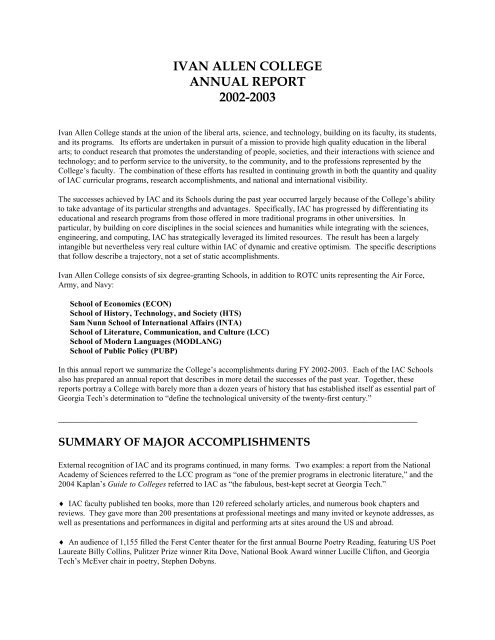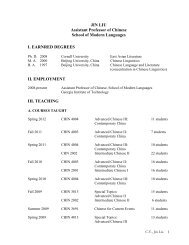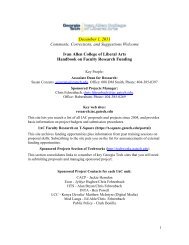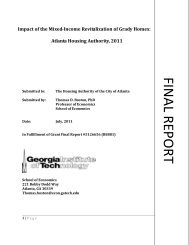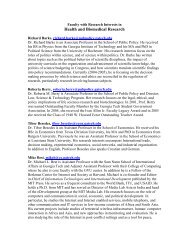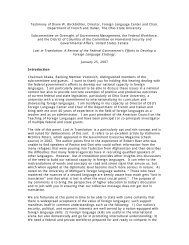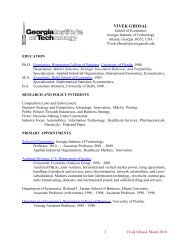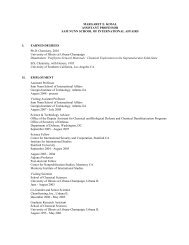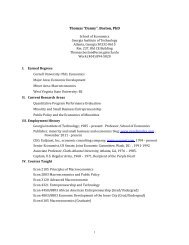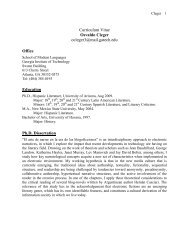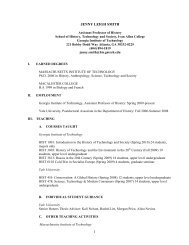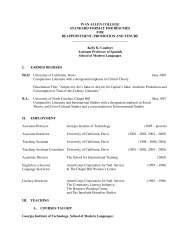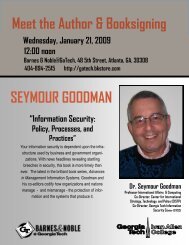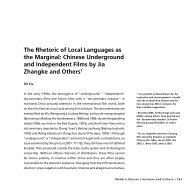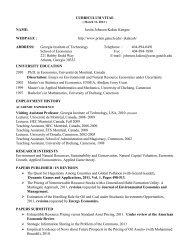IVAN ALLEN COLLEGE ANNUAL REPORT 2002-2003
IVAN ALLEN COLLEGE ANNUAL REPORT 2002-2003
IVAN ALLEN COLLEGE ANNUAL REPORT 2002-2003
You also want an ePaper? Increase the reach of your titles
YUMPU automatically turns print PDFs into web optimized ePapers that Google loves.
<strong>IVAN</strong> <strong>ALLEN</strong> <strong>COLLEGE</strong><br />
<strong>ANNUAL</strong> <strong>REPORT</strong><br />
<strong>2002</strong>-<strong>2003</strong><br />
Ivan Allen College stands at the union of the liberal arts, science, and technology, building on its faculty, its students,<br />
and its programs. Its efforts are undertaken in pursuit of a mission to provide high quality education in the liberal<br />
arts; to conduct research that promotes the understanding of people, societies, and their interactions with science and<br />
technology; and to perform service to the university, to the community, and to the professions represented by the<br />
College’s faculty. The combination of these efforts has resulted in continuing growth in both the quantity and quality<br />
of IAC curricular programs, research accomplishments, and national and international visibility.<br />
The successes achieved by IAC and its Schools during the past year occurred largely because of the College’s ability<br />
to take advantage of its particular strengths and advantages. Specifically, IAC has progressed by differentiating its<br />
educational and research programs from those offered in more traditional programs in other universities. In<br />
particular, by building on core disciplines in the social sciences and humanities while integrating with the sciences,<br />
engineering, and computing, IAC has strategically leveraged its limited resources. The result has been a largely<br />
intangible but nevertheless very real culture within IAC of dynamic and creative optimism. The specific descriptions<br />
that follow describe a trajectory, not a set of static accomplishments.<br />
Ivan Allen College consists of six degree-granting Schools, in addition to ROTC units representing the Air Force,<br />
Army, and Navy:<br />
School of Economics (ECON)<br />
School of History, Technology, and Society (HTS)<br />
Sam Nunn School of International Affairs (INTA)<br />
School of Literature, Communication, and Culture (LCC)<br />
School of Modern Languages (MODLANG)<br />
School of Public Policy (PUBP)<br />
In this annual report we summarize the College’s accomplishments during FY <strong>2002</strong>-<strong>2003</strong>. Each of the IAC Schools<br />
also has prepared an annual report that describes in more detail the successes of the past year. Together, these<br />
reports portray a College with barely more than a dozen years of history that has established itself as essential part of<br />
Georgia Tech’s determination to “define the technological university of the twenty-first century.”<br />
__________________________________________________________________________<br />
SUMMARY OF MAJOR ACCOMPLISHMENTS<br />
External recognition of IAC and its programs continued, in many forms. Two examples: a report from the National<br />
Academy of Sciences referred to the LCC program as “one of the premier programs in electronic literature,” and the<br />
2004 Kaplan’s Guide to Colleges referred to IAC as “the fabulous, best-kept secret at Georgia Tech.”<br />
♦ IAC faculty published ten books, more than 120 refereed scholarly articles, and numerous book chapters and<br />
reviews. They gave more than 200 presentations at professional meetings and many invited or keynote addresses, as<br />
well as presentations and performances in digital and performing arts at sites around the US and abroad.<br />
♦ An audience of 1,155 filled the Ferst Center theater for the first annual Bourne Poetry Reading, featuring US Poet<br />
Laureate Billy Collins, Pulitzer Prize winner Rita Dove, National Book Award winner Lucille Clifton, and Georgia<br />
Tech’s McEver chair in poetry, Stephen Dobyns.
♦ The amount of sponsored new research awards for IAC faculty increased to $6,174,276 in FY <strong>2003</strong>.<br />
♦ The School of Modern Languages, working with the Colleges of Engineering and Computing, the Coop Division,<br />
and the Office of International Education, introduced a new international internship program at the Technical<br />
University of Munich with support from Siemens, Inc., which provides employment experience in Germany.<br />
♦ The Sam Nunn School of International Affairs was one of a small number of elite programs to receive a $1.3<br />
million award from the MacArthur Foundation to strengthen scientific and technical input on international security<br />
issues; the award will support a Sam Nunn Security Fellowship program for scientist and engineers from the midcareer,<br />
post-doctoral, and pre-doctoral levels.<br />
♦ The international reputation of the School of Public Policy was demonstrated by its research affiliations with<br />
institutions on five continents: South America (CSIC, Uruguay), Europe (Ecole de Mines, Paris; CyberCities, Italy;<br />
Fraunhofer Institute/ISIR, Germany; Univ. of Twente, Netherlands), Africa (Univ. of Stellenbosch, South Africa),<br />
Australia (Universities of Wollongong and Western Sydney), and Asia (National Institute of Science and Technology<br />
Policy, Japan; Prime Minister’s Department, Malaysia).<br />
♦ The third annual Founder’s Day event in Spring <strong>2003</strong> was celebrated with the awarding of the Ivan Allen, Jr.<br />
Prize for Progress and Service to political columnist and author Molly Ivins and a panel discussion on the history of<br />
women faculty at Georgia Tech.<br />
♦ The School of Economics played a major role in the continuing operations of the Center for Paper Business and<br />
Industry Studies (CPBIS), sponsored by the Sloan Foundation. Five faculty worked on CPBIS sponsored projects in<br />
FY <strong>2003</strong>, along with five undergraduate students -- and the program was directed by the Chair of the School.<br />
Economics also initiated a new undergraduate degree program with the School of Modern Languages in Global<br />
Economics and Modern Language.<br />
♦ Faculty in the School of History, Technology, and Society continued their high level of scholarly output, with half<br />
of the full-time faculty publishing and article or chapter in a scholarly book. Other IAC Schools saw high levels of<br />
output as well; for example, Public Policy faculty published 56 refereed journal articles in FY <strong>2003</strong>.<br />
__________________________________________________________________________<br />
PEOPLE AND PROGRAMS<br />
Ivan Allen College has approximately 130 full-time tenure track faculty. In recent years it has enhanced its roster<br />
with hires from many of the top universities in the nation. In the <strong>2002</strong>-<strong>2003</strong> academic year, ten new tenure-track<br />
faculty joined the College:<br />
• Diana Hicks, Professor and Chair, PUBP (University of Sussex): science and technology policy<br />
• Hugh Gusterson, Associate Professor, PUBP and HTS (Stanford University): science studies<br />
• Narin Hassan, Assistant Professor, LCC (University of Rochester): science, technology, and postcolonialism<br />
• Edward Keene, Assistant Professor, INTA (London School of Economics): international relations, African and<br />
Asian politics<br />
• Cindy Klestinec, Assistant Professor, LCC (University of Chicago): Renaissance literature and medicine<br />
• Allison MacFarlane, Associate Professor, INTA and School of Earth and Atmospheric Sciences (MIT): science,<br />
technology, and security studies<br />
• Sylvia Maier, Assistant Professor, INTA (University of Southern California): international law and human rights<br />
• Minjae Song, Assistant Professor, ECON (Harvard University): industrial organization and applied econometrics<br />
• Colleen Terrell, Assistant Professor, LCC (University of Pennsylvania): American literature and culture<br />
• Angela Dalle Vacche, Assistant Professor, LCC (University of Iowa): film studies<br />
Current faculty continued to be recognized for their outstanding work. Among them:<br />
2
• Diane Gromala (LCC) was elected to the International Academy of Digital Arts and Sciences.<br />
• Eleanor Alexander's (HTS) Lyrics of Sunshine and Shadows: The Tragic Courtship and Marriage of Paul<br />
Laurence Dunbar and Alice Moore Dunbar (New York University Press, 2001) was featured on the cover<br />
of the New York Times Book Review, and was deemed one of the most notable books of the year.<br />
• Barry Bozeman (PUBP) received the Marshall Dimock award of the American Society for Public Administration<br />
for Best Lead article published in Public Administration Review in <strong>2002</strong>.<br />
• Willie Pearson, Jr., (HTS) was recognized for his service as chair of the National Science Foundation’s<br />
Committee on Equal Opportunities in Science and Engineering<br />
• John Krige (HTS) received the prestigious Charles A. Lindbergh Chair and Aerospace History, National Air and<br />
Space Museum, for AY 2004-05.<br />
• Dean Sue Rosser (HTS) was named American Association for Women in Science (AWIS) Fellow for leadership<br />
for women and science and was elected AAAS Fellow for distinguished leadership in research on the<br />
theoretical and applied issues for women in science and for service to the science education community.<br />
She also received the <strong>2003</strong> WEPAN Betty Vetter Award for Research.<br />
• Molly Cochran (INTA) received a Council on Foreign Relations International Affairs Fellowship to work for a<br />
year as Research Fellow and Lobbyist for Human Rights Watch, London.<br />
• John Endicott (INTA) was invited to serve on the Task Force on U.S. Korea Policy of the Center for<br />
International Policy.<br />
• Doug Davis, a Brittain Fellow in LCC, received the prestigious Nicholas Mullins Award for outstanding<br />
scholarship in the field of Science and Technology Studies, from the Society for Social Studies of Science<br />
for his paper "'One Hundred Million Hydrogen Bombs': Total War in the Fossil Record."<br />
• Alice Bullard (HTS) was one of 72 scholars (out of more than one thousand applicants) to receive a fellowship<br />
from the American Council of Learned Societies for her work “Mending a broken mirror: from colonial to<br />
transcultural psychiatry in French North and West Africa.”<br />
New Programs<br />
The School of Literature, Communication, and Culture was given approval to begin a Ph.D. program in Digital<br />
Media – the first such program in the US. The School of Modern Languages and the School of Economics<br />
developed a joint undergraduate degree program in Global Economics and Modern Languages (GEML), which<br />
was approved by the BOR in Spring <strong>2003</strong>. The Board also approved a renaming of the graduate program in HTS<br />
from “History of Technology” to "History and Sociology of Technology and Science"; the change recognizes the<br />
extension of the doctoral program to include sociology and the study of the sciences. The School of Economics and<br />
the Sam Nunn School of International Affairs continued their efforts to obtain approval for a new undergraduate<br />
degree in International Affairs and Economics.<br />
RESEARCH<br />
Fiscal Year <strong>2003</strong> was a record-setting year for IAC faculty in the financial support their research received. A total of<br />
$6,174,276 was awarded in research grants and contracts, with faculty from all IAC units obtaining external support.<br />
The strength of the IAC’s research programs in diverse areas of the liberal arts was demonstrated by the range of<br />
sponsors of new awards in <strong>2002</strong>-<strong>2003</strong>, including the National Science Foundation, the MacArthur Foundation, EPA,<br />
Kellogg Foundation, Georgia Department of Transportation, National Endowment for the Humanities, Rockefeller<br />
Foundation, the Carnegie Corporation, Council on Foreign Relations, and the American Council of Learned<br />
Societies. Leading the IAC was the School of Public Policy is $4.3 million in sponsored new awards, with the Sam<br />
Nunn School of International Affairs receiving $1.4 million.<br />
These grants reflected and reinforced a growing web of interconnections between IAC and other parts of the Georgia<br />
Tech community, as well as other universities and research institutes. Collaborators included faculty from many<br />
3
schools within the College of Engineering, the College of Sciences, and the College of Computing, as well as<br />
researchers at Resources for the Futures, Economic Development Institute, and the National Center for<br />
Supercomputer Applications.<br />
Among the many notable grants were<br />
• John Endicott, Sy Goodman, William Hoehn, and William Long, (INTA) received $1.35 million from the<br />
MacArthur Foundation to train scientists for national security policy.<br />
• Gordon Kingsley (PUBP), Georgia Department of Transportation, for a study of the strategic management of<br />
contracts, $1,958,591.<br />
• Barry Bozeman (PUBP), National Science Foundation, "Developing Capacity-Based Evaluation Approaches to<br />
University Science Centers Programs: Comparing Interdisciplinary Centers and Traditional Academic<br />
Units," $693,886<br />
• Peter McGuire (LCC) and Judith Norbeck (ISYE), NSF, pilot grant to study “Technical Communication within<br />
the Engineering Curriculum,” $75,000.<br />
• Philip McKnight (MODLANGS) and John Endicott (INTA), Korean Foundation grant to support Korean<br />
language instruction, $60,000.<br />
• Mary Frank Fox (HTS), NSF ADVANCE project, “Institutional Transformation,” $206,000.<br />
• Barry Bozeman and Juan Rogers (PUBP), NSF, “Developing Capacity-Based Evaluation Approaches to<br />
University Science Programs: Comparing Interdisciplinary Centers and Traditional Academic Units,”<br />
$692,891.<br />
• The College’s first NSF dissertation grant (Eliesh O'Neil Lane, PUBP, “Research Ethics and Public Values in<br />
Decision-Making: Implications for Human Subject Review”).<br />
Ivan Allen College faculty published sixteen books in <strong>2002</strong>-<strong>2003</strong><br />
• Philip Auslander (LCC), Performance: Critical Concepts in Literary and Cultural Studies.<br />
• Barbara Blackbourn-Jansma (MODLANGS), Le français pour l'ingénieur.<br />
• Kirk Bowman (INTA), Militarization, Democracy, and Development: The Perils of Praetorianism in Latin<br />
America.<br />
• Carol Colatrella (LCC), Literature and Moral Reform: Melville and the Discipline of Reading.<br />
• Bettina Cothran (MODLANGS), The Global Connection: Issues in Business German (co-editor).<br />
• Michael Elliott (PUBP and Architecture), Making Sense of Intractable Environmental Conflicts: Concepts and<br />
Cases, (co-editor).<br />
• Vicki Gallaway and Angela Labarca (MODLANGS), Visión y vos. 3rd Edition.<br />
• William Long and Peter Brecke (INTA), War and Reconciliation: Reason and Emotion in Conflict Resolution.<br />
• Masato Kikuchi (MODLANGS), A Systematic Approach to Business Japanese.<br />
• Phil McKnight (MODLANGS), Genie-Satire und Frauenerziehung. Zwei Studien und zwei literarische<br />
Dokumente (co-author).<br />
• Nancy Nersessian (PUBP), Logical and Computational Aspects of Model-based Reasoning, (co-editor).<br />
• Bryan Norton (PUBP), Searching for Sustainability: Interdisciplinary Essays in the Philosophy of Conservation<br />
Biology .<br />
• Ellen Strain (LCC), Public Places, Private Journeys: Ethnography, Entertainment, and the Tourist Gaze.<br />
• Steven W. Usselman (HTS), Regulating Railroad Innovation: Business, Technology, and Politics in America,<br />
1840-1920.<br />
• Lisa Yazsek (LCC), The Self-Wired: Technology and Subjectivity in Contemporary Narrative.<br />
IAC faculty also published more than 120 articles in refereed scholarly journals, along with numerous book chapters<br />
and reviews. They gave more than 200 presentations at professional conferences in the US and on nearly every<br />
continent; many of these were invited lectures or keynote addresses. IAC faculty with specializations in the arts<br />
performed their work in places such as New York and San Francisco, and abroad in Athens and England. An<br />
important part of the mission of Ivan Allen College is for the research output of its faculty to have a direct and<br />
immediate impact on decision makers. These aspects of IAC’s research productivity are described in the section<br />
below on “Service to the Community.”<br />
4
The international impact of IAC continued to grow as a result of research and educational collaborations with<br />
institutions around the world. LCC developed ties with Blekinge Tekniksa Högskola (Karlskrona, Sweden), the<br />
European University in St. Petersburg Russia, and the Newberry Library (Chicago). As described above<br />
(“Highlights”), the School of Public Policy has affiliations with universities or research institutes on every continent;<br />
for example, the Georgia Tech Technology Policy and Assessment Center (TPAC) in the School of Public Policy<br />
was selected as lead partner in a new research and policy study on “Knowledge Content in Key Economic Sectors in<br />
Malaysia,” sponsored by the United Nations Development Programme (UNDP) in conjunction with the Economic<br />
Planning Unit (EPU), Prime Minister's Department, Government of Malaysia.<br />
Students and Research<br />
IAC graduate students also achieved notable research successes. For example,<br />
• Pam Hassebroek (PUBP) co-authored an article with Sy Goodman (INTA) and two other graduate students<br />
on “International Coordination to Increase the Security of Critical Network Infrastructures,” published in the<br />
Journal of Information Warfare. They first presented their work at the International Telecommunications<br />
Union (ITU) Conference on information security, Seoul Korea.<br />
• HTS graduate students received grants or fellowships from the Society for the History of Technology, the<br />
Centre for the Study of the United States (University of Toronto), the Hagley Museum and Library,<br />
California Institute of Technology, the American Institute of Indian studies, the National Cancer Institute,<br />
the Finnish Cultural Foundation, Smith College, and Winterthur. They presented their research at numerous<br />
meetings and published in journals such as History and Technology.<br />
• Paul Counts (PUBP) and Alberto DiMinin (MSPP '02) made a presentation on "Economic Growth Models<br />
and High Tech Potential," drawing on their joint MSPP thesis research on technology assets and<br />
development in Savannah and Pisa, at the Regional Studies Association conference on Reinventing Regions<br />
in the Global Economy, Pisa, Italy.<br />
• Students in LCC’s MS in Information Design and Technology interned at Maxis Software with Will Wright,<br />
the creator of Sim City and The Sims, while other IDT students interned at Electronic Arts, LucasArts, the<br />
National Academy of Television Arts and Sciences, GPTV and at PBS in Washington, and (by request) at<br />
the Museum of Modern Art in New York City.<br />
IAC faculty and undergraduate students enthusiastically embraced the new campus initiative on undergraduate<br />
research. At least 14 students participated in the President’s Undergraduate Research Award program in FY <strong>2003</strong>.<br />
Reflecting the integration of IAC into programs across campus, many of the IAC PURA awards were provided to<br />
students from other GT colleges, while IAC students worked with faculty in other colleges on other projects.<br />
A number of undergraduates saw their research efforts recognized professionally. For example, Whitney Setzer<br />
(INTA) was selected as a Center for the Study of the Presidency Fellow, while Ashley Jennings (STAC) worked with<br />
Prof. Kirk Bowman (INTA) on two journal articles on the correlates of post-materialist environmental values<br />
utilizing data from a survey conducted and constructed by undergraduate students in Costa Rica during study abroad<br />
<strong>2002</strong>. IAC undergraduates also interacted with the world beyond Georgia Tech by attending scholarly conferences<br />
in fields related to PUBP, HTS, INTA, and STAC. They interned with a wide range of organizations, including<br />
numerous law firms, CNN, Capital Impact, the Cartoon Network, Georgia Electric Membership Corporation, and the<br />
US Secret Service.<br />
The Pi Alpha Delta pre-law society was recognized as the best professional pre-law society in the nation (in only its<br />
second year of operation). The success of the pre-law program was recognized by the Wall Street Journal, which<br />
ranked Georgia Tech as 6th among public universities as a feeder university for prestigious law schools.<br />
5
EDUCATION<br />
In Fall <strong>2002</strong> there were 742 undergraduate students majoring in IAC degree programs, a nine percent increase over<br />
the preceding year and a forty percent increase in only three years. As designed, the number of graduate students<br />
held roughly steady at 218 (160 M.S., 58 Ph.D.). The number of credit hours taught by IAC grew to 74,830 in FY<br />
<strong>2003</strong>, an increase of seven percent from the previous year and an increase of nearly twenty percent in the past three<br />
years.<br />
New courses and new teaching techniques were introduced in all IAC Schools in FY <strong>2003</strong>. As the Schools’ annual<br />
assessment updates describe, in many cases existing courses were revised based on student feedback and other<br />
measures of teaching effectiveness.<br />
Two examples of new courses involved collaborations with the School of Civil and Environmental Engineering.<br />
First, under the rubric of the McEver Program in Engineering and the Liberal Arts, a course in "Designing Progress,<br />
Defining Progress" brought IAC and civil engineering majors together to explore how design processes in<br />
engineering, public policy, architecture, and the arts promote progress. Another course, on "Natural Gas<br />
Deregulation Policy in Georgia," was taught as an undergraduate and graduate seminar in Public Policy (with<br />
President Wayne Clough), taking advantage of President Clough’s expertise on the topic by examining the state<br />
policy initiative in extensive detail, including discussions with key decision makers from state government and<br />
industry.<br />
Other new courses in <strong>2002</strong>-<strong>2003</strong> included Technology Law, Policy & Management; Japanese Society and Politics<br />
(taught in Japanese); Issues in China Studies (taught in Chinese); and Cuba at the Crossroads. The School of<br />
Modern Languages instituted a new course in Arabic, and saw a continuing increase in enrollments (and requests for<br />
overloads) in nearly every language taught by the School. The quality of the Modern Languages faculty was<br />
reflected in Nora Cottille-Foley’s receipt of the BP-Amoco Junior Faculty Teaching Award.<br />
The educational activities of IAC faculty extended beyond the borders of the campus and the US. The Blekinge<br />
Tekniksa Högskola, a new Swedish institution established to build curricula that bring together disciplines in the<br />
natural and human sciences identified LCC’s undergraduate and graduate programs as a model for curriculum<br />
development, with the Swedish Ministry of Education inviting six of the School’s faculty for extended visits. Philip<br />
Shapira (PUBP) conducted R&D evaluation programs at the University of Twente, Enschede, The Netherlands, and<br />
with the Ministry of Education, Culture, Sports, Science and Technology (MEXT), Government of Japan, Tokyo.<br />
The Nunn School continued to offer and develop summer study abroad programs in Costa Rica, Brussels, China, and<br />
Cuba, and the School of Modern Languages continued its LBAT summer immersion programs in China, France,<br />
Germany, Japan, Mexico, and Spain.<br />
SERVICE<br />
All Georgia Tech faculty have a fundamental responsibility to provide service to their units, the Institute, the<br />
community (from local to international), and to their professions.<br />
Institute<br />
Jay Telotte (LCC) was elected to the Georgia Tech Executive Board, while David Shook (MODLANGS) served on<br />
the Student Grievance and Appeal Committee and Gus Giebelhaus (HTS) served on the Student Honor Committee.<br />
Faculty served as advisors for student organizations (e.g., Hans Klein for WREK radio) or as faculty mentors for<br />
students (Carol Colatrella, LCC and Monica Gaughan, PUBP, Women, Science, and Technology Program). Bob<br />
Kirkman (PUBP) worked with the Office of Student Integrity on the development of a campus-wide seminar on<br />
Ethics. Richard Barke (PUBP and Associate Dean), served on the SACS Accreditation Council, on the GT<br />
Institutional Review Board, and the Student Regulations Committee.<br />
6
Community<br />
Much of the research output of IAC faculty was designed to have a direct and immediate impact on decision makers.<br />
For example, in the School of Public Policy, Ann Bostrom was on the Executive Committee, Board of Scientific<br />
Counselors, U.S. EPA and on a National Research Council Committee on the transportation of nuclear waste. Susan<br />
Cozzens served on the National Academy of Sciences committee on biotechnology and a panel on the “Ethical,<br />
Legal, and Social Implications of the Human Genome Project,” National Institutes of Health. Hans Klein chaired<br />
Computer Professionals for Social Responsibility, while Bryan Norton was on the Board of Governors of the Society<br />
for Conservation Biology.<br />
HTS faculty also served on national committees and task forces. Dean Sue Rosser served on the Steering Committee<br />
for the National Academy of Engineering’s Committee on the Engineer of 2020, the Higher Education Panel for<br />
Building Engineering and Science Talent, and chaired the NSF EHR CAREER Awards Panel, among other service<br />
roles. HTS Chair Willie Pearson was a member of the National Academy of Sciences Committee on Women in<br />
Science and Engineering and many other advisory boards and panels; he also chaired the AAAS Committee on<br />
Science and Engineering Public Policy, was vice chair of the NSF Committee on Equal Opportunities in Science and<br />
Engineering.<br />
In the School of Economics, Danny Boston served on the Atlanta Regional Commission’s Technical Advisory Group<br />
for long term forecasts, while Willie Belton was a board member for the Salvation Army of Atlanta. Usha Nair-<br />
Reichert worked with a group that promotes economic development and provides medical services to rural Haiti.<br />
Several members of the INTA faculty served on the Council on Foreign Relations (Molly Cochran, William Hoehn,<br />
William Long), while others served as advisors to organizations such as the Canadian Immigration and Refugee<br />
Board (Fei-Ling Wang), the Swiss Center for Democratic Control of the Armed Forces (Robert Kennedy), and the<br />
Russian-American Nuclear Security Advisory Council (William Hoehn). INTA professor Sy Goodman provided<br />
advice to numerous national governments on information security issues, and John Endicott continued to work with<br />
many governments on the establishment of a nuclear-free zone in northeast Asia.<br />
Professions<br />
Dozens of IAC faculty served as editors, editorial board members, and reviewers for scholarly publications. For<br />
example, a dozen members of the HTS faculty served on editorial boards of academic journals. IAC faculty served<br />
as panel members for NSF on topics such as "Multidisciplinary Research into Critical Infrastructure and Related<br />
Systems - Mitigation, Preparedness, Response and Recovery Regarding Disasters and Other Extreme Events." They<br />
also contributed to their academic disciplines, such as Fei-Ling Wang’s administration of the Global Forum of<br />
Chinese Political Scientists with scholars from six nations.<br />
7


